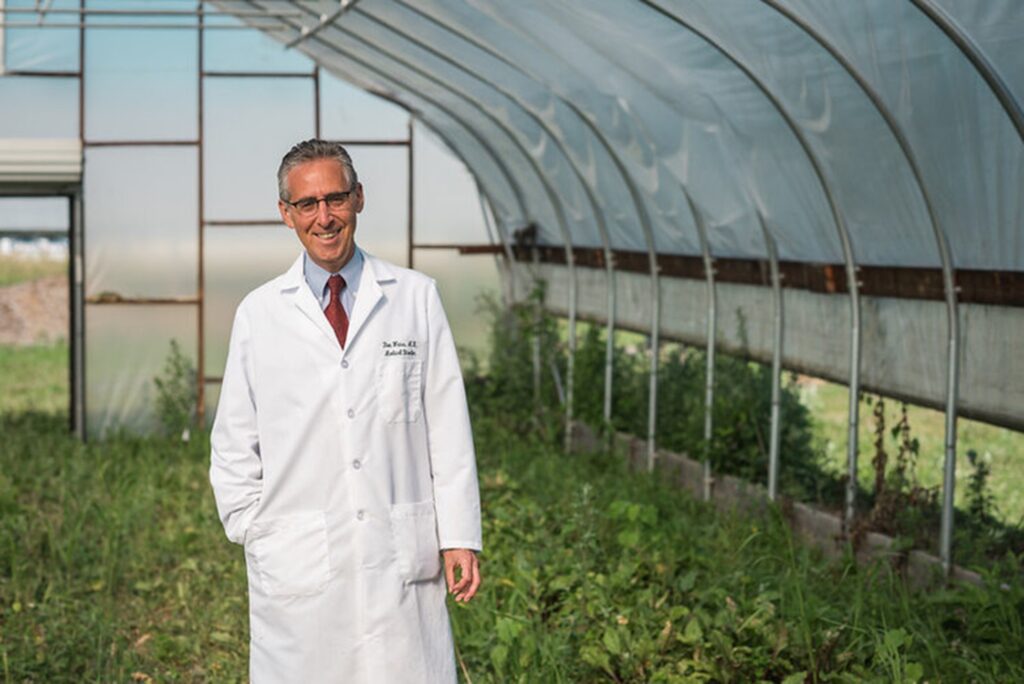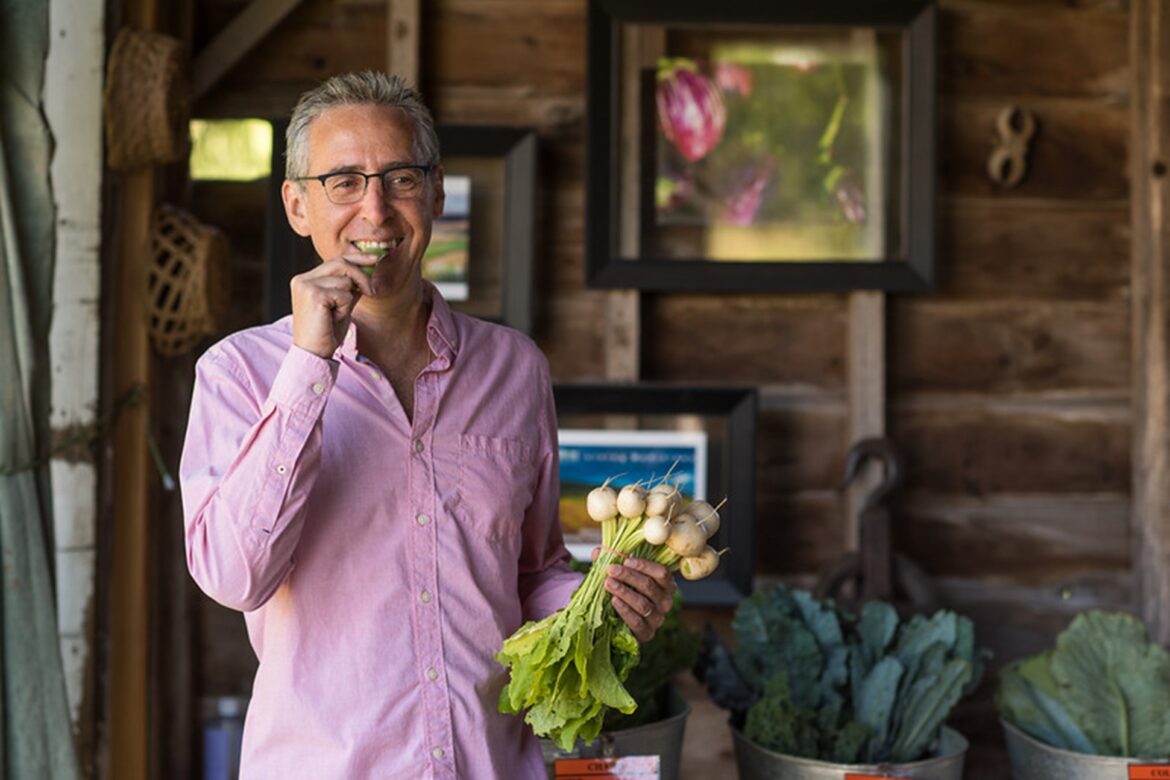Photo: Dr. Ron Weiss is a primary care physician in New Jersey and New York, who serves as Executive Director of Ethos Primary Care and as Assistant Professor of Clinical Medicine at Rutgers New Jersey Medical School.
For most of his life, Dr. Ron Weiss has been trying to find a way to combine his two great loves – medicine and farming. Although medicine was not his first inclination, his parents’ influence on his career path would later take him through a personal journey of practicing conventional medicine, while incorporating lifestyle medicine into his primary care practice. Until this day, Dr. Weiss maintains that there’s no more meaningful profession in the world – except perhaps from farming – than being a physician. He finally found the chimera of medicine and food in his 342-acre chemical-free farm in New Jersey, where he offers a new vision for medicine, inspiring a dynamic healthcare paradigm for patients in New Jersey, New York, and beyond. This is why Dr. Ron Weiss is our Eco Maven for July! Let’s dive into his approach to food as medicine and how to reverse chronic diseases with a plant-based diet.
1. Being a primary care physician, what made you want to become a botanist and a farmer? Was this the plan all along, or was it the result of a particular experience while working in the medical field?
My love affair with plants came first, then medicine. When I turned four years old, my mother gave me a package of seeds as a birthday present, which significantly impacted my life. The seeds were Four O’clocks, also known as the Marvel of Peru, which are unique flowers that open up mid- to late-afternoon (at 4 pm) every day, display beautiful flowers, and even different colors in the same plant. From there on, I grew a deep appreciation for their beauty, and my love for the natural world flourished. This experience also shaped my passion for farming, but my parents wanted me to be a doctor, so I pursued a career in medicine, becoming a physician when I was 26 years old. However, my love for plants was always on my mind.

2. Tell us about Ethos Primary Care?
Ethos Primary Care is like the offspring of my first medical practice, which I started as a community medical center in West New York after working primarily as an emergency doctor for seven years. The then-new facility opened seven days a week, and it was the real foundation of community health since it took care of everyone, from babies to seniors at home. We even offered a comprehensive primary care plan to the uninsured and delivered 30 babies a year. Even though we were very successful in providing care, the clinic could not cover its cost due to low insurance reimbursements. I began to understand that the rising tide of chronic disease in this hard-working Latino community – the obesity, diabetes, hypertension, heart attacks, cancer, was coming from the food people were eating. I began to look at this epidemic of chronic disease literally as food poisoning on a massive scale.
I sold the practice and bought the farm to build a food system that would feed and take care of the community, a new farm-based healthcare system.
3. For most of our lives, we have been conditioned to see traditional medicine as the preferred way to treat health conditions. Can you share with our readers the principles of the Ethos diet and how can it reverse chronic diseases?
The Ethos diet is a lifestyle regimen based on whole plant foods, derived from a cache of scientific evidence that indicates this is the most effective way of reversing and preventing chronic diseases. What makes us unique is that the whole plant foods we use are grown to protect the mothership: our planet, the water that the community drinks from, the forest, the pollinators that support the natural ecological function of plants. We need all of the things to be intact for our human connection with the natural world and our survival.
4. What are the most common health issues you treat with the Ethos Diet?
Chronic diseases like asthma, diabetes, obesity, hypertension, chronic kidney disease, cancer, heart disease, autoimmune disease.
5. Can you give us some examples of success?
Sure. For older people with osteoarthritis, for example, even when they are at a point where they have scheduled a knee or hip replacement, odds are that they will cancel their operations within a week or two of going through our treatment. This is independent of the weight loss that naturally occurs with the diet. We have noticed that even with significant destruction of the joints, once people adopt a whole plant foods diet, chances are that their pain will resolve. I believe this is because aside from joint surface destruction, degenerative arthritis has a significant inflammatory component which is relieved by the anti-inflammatory nature of a whole food plant-based diet. Actually, most chronic ailments have a significant inflammatory component, and this is why whole plant foods reverse most of these illnesses. Take asthma for example, which is known to be driven by inflammation in the air passages. This is why steroids, which are powerful anti-inflammatory agents, are primarily used to treat asthma. We have been very successful at reversing asthma completely. Most people treated with the Ethos diet don’t have to take any medications anymore. When the coronary arteries are clogged by atherosclerosis, people think about cholesterol as the offending agent. However, inflammation in the lining of the arteries is likely even more important than cholesterol in clogging the arteries. We have met with success in reversing coronary artery disease with the Ethos Diet.
Here is a testimonial about reversing Diabetes & Hypertension.
6. How can people manage the urge to have other types of foods rather than only vegetables?
First, to be clear, a healthy diet of whole plant foods is more than just vegetables, it includes all edible plant foods. Foods high in fat, salt, and sugar trigger food cravings known as “The Pleasure Trap” as described by Drs. Doug Lisle and Alan Goldhamer in the book of the same name. These foods elevate dopamine neurotransmitters in our brain which provide us with pleasure, thus we become addicted to eating them. The more a person avoids these foods and their addictive potential, the more satisfaction he or she will derive from eating whole plant foods, and cravings will resolve.
Sometimes it takes many years for people to change their mindset. But once somebody decides to do it, and do it well, eventually they don’t go back to their old food habits.
7. How long -approximately- would it take for a patient to see results when adopting an Ethos diet?
We have a 30-Day Detox program that is so intensive and engineered to replace traditional drugs with plant medicines that the blood pressure gets lowered on day two or three for someone who has lived with the condition for decades. This, of course, happens generally speaking. We can’t do this all at once with certain people with severe hypertension problems or immune systems that are critically broken. But, overall, the results we have achieved with the Ethos diet are noticed quickly, depending on what we address. Constipation can take one day. A lifetime of heartburn can resolve in a few days. If it is Multiple Sclerosis, it could be a couple of months. If it is Rheumatoid Arthritis, it could take a couple of weeks, or if it’s Obesity, depending on how dedicated you are, you could lose a pound a day. We’ve had diabetics enter the Detox on massive doses of insulin and reach the 30th day off all insulin with better-controlled sugars than when they started the Detox.
If the 30-Day Detox program sounds like a big commitment and you instead start little by little, there are other options you can choose from. Dr. Weiss’ 2-Week Challenge (self-directed program), single office visits where you can come for an evaluation, the 365 Plant-Based Immersion, and the Mindful Living Journey are some of the signature programs offered by this approach.
Our objective is to heal our patients, to reverse their illnesses. Once this has been accomplished, Our Mindful Living Journey program helps patients to maintain good health for the rest of their lives. It includes comprehensive primary care with 24/7 access to the doctor for $1,500 a year.
For additional details, visit Ethos Primary Care.
8. Are your treatments accessible for people in general?
Ethos Primary Care is a lifestyle medical practice. Food is a major way we work with patients to change their living habits or lifestyle. But we also focus on their fitness, sleep, stress reduction, social connection, and avoidance of harmful substances. To succeed in our practice, patients must be interested in improving their lifestyle; thus, I would say our approach is not for everyone. Most people are content going to conventional doctors who manage their illnesses with medications, procedures, and surgeries. It is much easier to take pills than change the food you’ve been eating your whole life. But if you place a high value on reversing illness, feeling your best self, and truly preventing sickness, and have a high quality of life into your 9th, 10th, and who knows, perhaps even 11th decade of life, then Ethos Primary Care is for you!
9. What is the meaning of a vegan-friendly plant-based diet? Does this mean that some grains can be incorporated? Are some white meats like fish out of the question?
Whole grains are an essential part of our diet. Those who think that we eat leaves all day long are going to be surprised. We eat all whole plants, including fruits, vegetables from land and the sea, such as seaweed, all kinds of starch, which includes legumes like beans and lentils, starchy roots like potatoes, sweet potatoes, and yuca. We also eat spices, seeds and nuts, and of course mushrooms, which are not plants but are very important from a health standpoint. We encourage our patients not to eat fish. Eating just two servings of fish per week has been shown to double one’s risk of developing diabetes. Even wild-caught fish is highly contaminated with dangerous environmental pollutants like PCBs, dioxin, heavy metals, flame retardants, and microplastics. On top of this, fishing practices are incredibly damaging to our long-suffering oceans. I encourage everyone to see the documentary Seaspiracy.
10. Nowadays, we hear more and more about “food as medicine.” Where do you stand with this proposition?
This realization comes from Hippocrates himself, the founder of western medical thought. I see the power of this proposition every time a patient adopts a diet of whole plant foods. Food as medicine is at the core of everything we do at Ethos.
11. What is it about nature that is so connected to humans and yet not fully considered when treating patients?
Humans came from the soil, and we live off food that comes from the soil. It was J.I. Rodale who said Healthy Soil = Healthy Food = Healthy People. Yet, doctors are taught woefully little about nutrition, let alone soil, the environment, and good farming practices.
Doctors are not taught how human beings are connected to the greater network of life that surrounds us. Instead, they are taught to use pharmaceuticals to manage chronic diseases.
Plants have the power to reverse diseases. Eating whole plant foods that are grown without damaging the world is the most powerful, promising, and hopeful thing that people can do. So, three times a day, when you pick up your fork, make sure plants are on the end of it. The more plants, the better. And if people reading this interview do the same, we and the planet will be well.
12. Tell us about your Ethos Farm Project?
The Ethos Farms Project was selected by the Rockefeller Foundation last year as a semifinalist in their global competition to envision a regenerative and healthy food system that could feed the world by 2050. The Ethos Farm Project tries to bring that vision forth. It consists of the following four major components.
- Grow whole plant foods regeneratively, feed them to the community, and raise a new generation of farmers who can do it. While doing that, we can make New Jerseyans self-sufficient in feeding themselves again.
- Raise a new generation of physicians who understand how whole plant food and lifestyle medicine can reverse and prevent illness and save our country from the devastating economics of our medical care system, which is unsustainable. Bear in mind that as part of it, we educate medical students and young doctors here at the farm. We have the first farm-based medical education rotation from Rutgers New Jersey Medical School, where I am an assistant professor.
- The Ethos Farm Ecosystem and Carbon Trial (EFECT) is an important research project with our partners Rodale Institute, the world-leading organic agriculture authority, and Rutgers University. We are studying how we are transforming this 300-year-old farm, which used to grow genetically modified corn and soybean, into a farm that can feed the community real food. We are also studying how native plants can restore our soils, take carbon out of the atmosphere, and address climate change and build people’s health.
- Public Education: next year, after the pandemic, we hope to resume our Ethos Farm Day Festivals, which educate people about the connections between regenerative farming, delicious food, and human and planetary health.

13. How do you see the health industry evolving in the next five years, especially after COVID-19?
As the healthcare industry usually does – by engineering pharmaceutical solutions instead of addressing the cause of emerging zoonotic diseases, and that is humankind’s unnatural and unhealthy relationship with animals as it relates to our food system.
14. How did your life evolve after creating Ethos Primary Care? Do you follow a plant-based diet?
The practice and the farm operation are growing. Sometimes it feels there are just not enough hours in the day. However, with each day, I’m more grateful than I ever was. Gratitude is what keeps me going. I assembled this fantastic team at Ethos, and each one is a healer – we call them Ethosians! My work is deeply meaningful for me. Though I’m now 59 years old, I can never imagine retiring, and I hope to grow very old! And yes, I do practice what I preach – I eat a diet of whole plant foods.
15. What advice can you give to those readers that can’t adopt a plant-based diet but still want to live a healthy life, free of chronic diseases?
Keep thinking about changing your lifestyle because it is ultimately the best way to be free of chronic disease.
16. If you could make one significant environmental change next year, what would it be?
My 2002 Honda Accord now has 250,000 miles on it. I’d like to replace it with an electric vehicle.
17. Who inspires you?
I have many inspirations. My mentors, Dr. T. Colin Campbell, Dr. Caldwell Esselstyn, and Dr. Joel Fuhrman were the generation before me, and I stand on their shoulders in my work as a physician. My staff inspires me – a great passion drives each one to heal. My family inspires me – my wife’s unflinching dedication in caring for our children, and our children themselves. As they grow through their teen years, their awakening consciousness to care for the world around them is an inspiration for me.
18. What do you want your legacy to be?
I want to be remembered as a physician who cared for mother earth.
—
Dr. Ron Weiss is not only a physician but also a botanist and farmer, and he offers an evidence-based, food-as-medicine approach to healing chronic illness and optimizing wellness. His practice is at 177 West Mill Road, Long Valley, NJ 07853.
 Food
Food Farmers
Farmers Sustainable Living
Sustainable Living Living Planet
Living Planet News
News